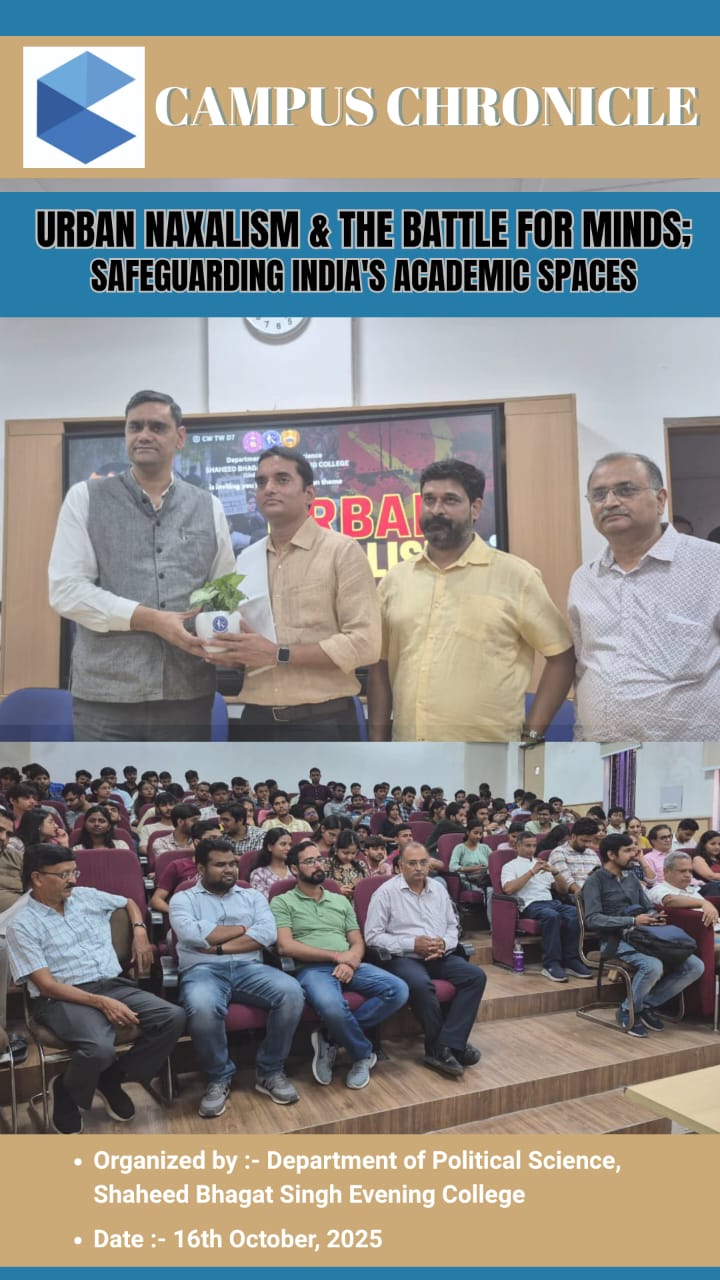The Department of Political Science, Shaheed Bhagat Singh Evening College, University of
Delhi, organised a symposium on “Urban Naxalism and the Battle for Minds: Safeguarding
India’s Academic Spaces” on 16th October 2025. The event was chaired by Dr. Saurabh
Dubey, Teacher-in-Charge of the Department, and drew inspiration from the Hon’ble Vice-
Chancellor, Prof. Yogesh Singh’s recent address at Vigyan Bhawan, where he had
highlighted the dangers of ideological subversion within academia and the need to protect
intellectual spaces from distortion.
The event was graced by Prof. Arun Kumar Attree, Principal of the College, and eminent
speakers Dr. Ayushi Ketkar and Dr. Sajjan Kumar.
In his address, Prof. Arun Kumar Attree emphasised the significance of the symposium in
the present national and academic context. He endorsed the concerns raised by the Hon’ble
Vice-Chancellor and appreciated the Ministry of Home Affairs under Shri Amit Shah for its
strong and visionary efforts toward achieving a “Naxal-Mukt Bharat” by 2026. He urged
students to understand the ideological dimensions of the issue and to view it through the
lens of national responsibility. Referring to the film “Buddha in a Traffic Jam”, he encouraged
students to reflect critically on how certain intellectual spaces can become breeding grounds
for narratives that distort facts and weaken national resolve.
Dr. Sajjan Kumar, noted political analyst, provided a comprehensive understanding of the
evolution of Urban Naxalism, tracing its ideological roots and transformation from armed
insurgency in rural areas to intellectual activism in urban centres. He explained how rural
naxalism operates through violence and coercion, while urban naxalism seeks legitimacy
through academia, civil society, and media. Dr. Kumar praised the Government of India’s
dual approach under Prime Minister Narendra Modi – combining decisive security action with
inclusive development – which has significantly reduced both the territorial spread and
ideological appeal of naxalism.
Dr. Ayushi Ketkar, academic and security expert, addressed the dichotomy of the so-called
“Urban Naxals” — those who claim to work for the poor and the marginalised yet thrive in
urban comfort and intellectual elitism. Sharing insights from her own academic journey from
the University of Hyderabad to Jawaharlal Nehru University, she reflected on how ideological
ecosystems within campuses often suppress alternative viewpoints. She urged students to
develop critical thinking rooted in national consciousness and moral integrity.
Dr. Saurabh Dubey, Teacher-in-Charge, in his remarks, highlighted that the event was
conceptualised to translate the Vice-Chancellor’s vision into meaningful academic dialogue.
He emphasised that universities must uphold intellectual freedom while remaining vigilant
against ideological infiltration that undermines the spirit of inquiry and national unity.
The event witnessed enthusiastic participation from students and faculty members, followed
by an interactive session. The discussion reinforced the collective commitment to preserve
universities as spaces of learning, critical debate, and constructive patriotism — in alignment
with the nation’s aspiration for a “Naxal-Mukt Bharat.”
However the urban naxal term more sound as political rather than legal . When Indian
express filed RTI to MHA( Ministry of Home affairs) have not any information related to
urban naxal or no official definition of it . There’s no mention of urab naxal in laws like
UAPA ( Unlawful activity and prevention act ) of 1967. Journalist academic have critical
approach towards urban naxal because government using this term to label those who
dissen with them . Right to dissent is fundamental right which comes under right to freedom
of speech and expression.





